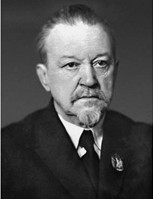
Birthday anniversary of Dmitry N. Ushakov, philologist, corresponding member of the Academy of Sciences, USSR
12 (24) January 1873, in Moscow, was born Dmitry N. Ushakov, linguist, specialist in Russian dialectology and lexicology, corresponding member of the Academy of Sciences of the USSR (1939), editor and co-author of one of the "Explanatory dictionary of the Russian language."
Father of Dmitry Nikolayevich died when he was two years old, so Dmitry Ushakov grew up in the house of his mother's father, Dmitry Petrovich Novsky, protopresbyter of the Moscow Grand Assumption Cathedral in the Kremlin, a member of the Moscow office of the Holy Synod, the censor of the magazine "Orthodox Observer".
Having received the initial education at home, in 1882, Ushakov was enrolled in preparatory class of the First Moscow six-class gymnasia, and in 1889 - in the seventh grade of the Fifth Moscow gymnasium, after which he entered the Moscow University in the History and Philology. Great influence on the scientific views of D. N. Ushakov had his university professor, founder of the Moscow linguistic school, F. F. Fortunatov. Ushakov’s work for his candidate degree "Homer’s declensions" was highly appreciated by Fortunatov, and he recommended Ushakov to stay after graduation at the department in order to prepare for a professorship in the department of comparative linguistics and Sanskrit language.
After graduating from university in 1895 with a 1st degree diploma, Ushakov first took up teaching at high school, and in 1900-1901 passed the master's examinations and read two test lectures - "The main trends in the study of Russian folk epic" and "Moscow dialect as the basis of the Russian literary language."
From 1907 to 1930 Ushakov worked at the Russian Language Department of the Moscow University, first as a lecturer, then as a senior assistant, full-time associate professor, professor. In addition, over the years Dmitry taught at the Higher women pedagogical courses, at the Higher women courses, the Poltoratskaya Higher women courses, the Higher military educational school, the Bryusov Literary Institute, the State Institute of the Word, the Editing and Publishing Institute of the OGIZ.
Dmitry Nikolaevich was one of the organizers, and in 1915-1931 – the Chairman of the Moscow dialectological commission at the Academy of Sciences.
From 1920 to 1929, Ushakov was a member of the Scientific Research Institute of Language and Literature RANION, and from 1923 to 1927 - Chairman of its linguistic section. In 1930-s, Dmitry headed the Spelling Commission of the People’s Commissariat (Ministry) of Education and directed the Department of Russian language at the Institute of Languages and Writings of the peoples of the USSR.
In the book "Russian spelling", written by Ushakov back in 1911, he analyzed the relationship between spelling and pronunciation in Russian literary language. In this work Ushakov for the first time substantiated the need for reform of Russian orthography. In 1917-1918 he became an active member of the drafting of the spelling reform.
Already in 1920s, Ushakov started working on "The Explanatory Dictionary of the Russian language" as compiler and editor. Ushakov's dictionary is the first Soviet normative dictionary, which adequately covered the vocabulary of literary language. The normative character of the dictionary was stipulated by selection of words and their meanings, indication of the correct pronunciation, accent, spelling, appropriateness of use. In the 1935-1940, there were published four volumes of "The Explanatory Dictionary of the Russian Language", with more than 90, 000 entries.
January 15, 1936 Dmitry Nikilaevich was approved in the degree of Doctor of Linguistic Sciences of VAK (Higher Attestation Commision) of the People’s Commissariat of Education, and in 1939 was elected a corresponding member to the Academy of Sciences of the USSR.
With the beginning of the Great Patriotic War Dmitry Ushakov was evacuated to Tashkent, where he died on April 17, 1942 and was buried in the Botkin Cemetery.
Lit.: Иорданский А. М. Д. Н. Ушаков // Русский язык за рубежом. 1973, № 3; Панов М. В. Дмитрий Николаевич Ушаков. Жизнь и творчество // Д. Н. Ушаков. Русский язык. М., 1995. С. 8–40; Реформатский А. А. Д. Н. Ушаков // Русский язык в школе. 1973, № 1; Ушаков Д. Н. Русское правописание. Очерк его происхождения, отношения его к языку и вопроса о его реформе. М., 1911; Он же. Краткое введение в науку о языке. М., 1913; Он же. Учебная книга по русскому языку. Ч. 1–2. М.; Л., 1925–1926; Он же. Сборник статей по языковедению. М., 1941.
Based on the Presidential Library’s materials:
Ушаков Д. Н. Для просеминария по русскому языку. М., 1916;
Ушаков Д. Н. Краткое введение в науку о языке. М., 1925;
Ушаков Д. Н. Краткое введение в науку о языке. М., 1928;
Ушаков Д. Н. Материалы по народным верованиям великоруссов. М., 1896;
Ушаков Д. Н. Новое правописание. М., 1917;
Ушаков Д. Н. Орфографический словарь : для начальной, неполной средней и средней школы. М., 1936;

